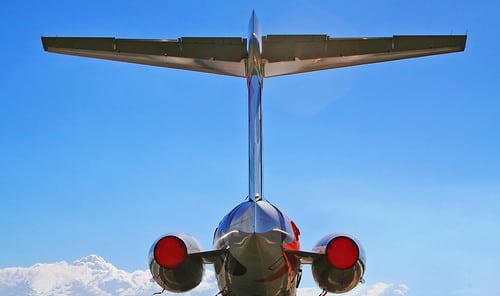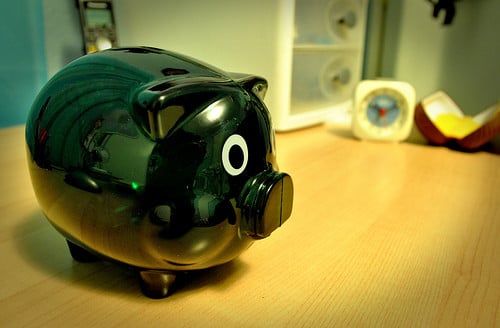Travelers are constantly bombarded with reduced fares, flight deals, and cheap ticket offers making it seem like getting the best deal is akin to hearing the meaning of life. Once you get that low fare after weeks of searching (if you end up taking the flight at all) you’re free to splurge on hotels, food, and drinks, ensuring you completely bust your simple travel budget.

The truth is that you’ll be able to travel more if you focus on saving on all the things many travelers consider as afterthoughts – that is, everything in between flights.
Search For Flights Without Obsessing Over Nothing
Granted, the competitive nature of looking for the absolute lowest fare can be a fun game, especially if you’ve got a few hours to kill at the office on a Friday afternoon. The key to actually traveling however, is to put a limit on what you’re willing to spend and how long you’ll spend looking. You probably won’t magically find a free flight so it’s best not to look at $0.00 as some utopia you’ll never reach.

- Create An Upper Limit – If you’ve got a particular destination in mind, when searching for flight deals, set a price you can afford and put aside a week trying to get as far under that number as you can.
 Open Your Options – Flight fares are relative, and if you’re willing to tweak your destination you might find a few deals well within your budget. (Use Kayak Explore to narrow down the search.)
Open Your Options – Flight fares are relative, and if you’re willing to tweak your destination you might find a few deals well within your budget. (Use Kayak Explore to narrow down the search.)- Use Multi-City Flights – Adding a destination or booking individual legs separately can often be less expensive than a straight round-trip route. (Going overland for two closer cities might be cheaper still.)
- Visit Off-Season – That doesn’t necessarily mean go to north Sweden in the dead of winter (but maybe Iceland); generally the spring and fall months aren’t peak for most places around the world. Fares tend to be lower and temperatures nearly as warm or cool.
Finding the absolute, lowest, cheapest fare to be found in the course of human history isn’t (and shouldn’t) be your goal. Find a fare you can afford using the Internet as your personal advantage over the airlines and then you can get down to really saving your money.
Make Those Extra Dollars And Cents Count
Paying close to standard fare for a given flight route doesn’t mean you have to throw your money out the door. While you might not get that extra $45 discount, you can still spend effectively to save more in the long run.

- More Miles – Choose a bank account that helps you earn frequent flyer miles and have each dollar count toward a free ticket or upgrade. (Aren’t a member of any program? Get started with this 8 minute guide for reluctant travelers.)

Rather than wasting time (your most valuable asset) trying to get the absolute lowest fare – which often results in paying more as seasons change – be efficient in your spending and look at the few extra cents as a travel savings account for miles, upgrades, and other perks.
Where The Real Savings Start
Most people typically focus on airfare since it’s a set figure and single payment that’s easy to conceptualize (until you end up paying several fees before checkout). Your leeway for saving on airfare isn’t nearly as great as it is with lodging, eating, and local transportation.

- Make Prices Tangible – We like to focus on set prices and numbers so come up with some for the most common expenses using Budget Your Trip (original interview).
- Consider A Private Hostel Room – Commonly associated with dorms, many hostels offer private rooms at around twice the price of dorms but often half that of a comparable hotel room nearby. (To save even more, try these hostel alternatives.)
- Use Skype Over A Cell – A monthly bill or roaming charges are two things you can really do without to save money while traveling.
- Go Grocery Shopping Just Once A Week – The markup on prices eating out (beginning around 25%) is much higher when compared to the 5% profit margin for the airlines. Though there may not be a kitchen nearby, some fruit or snacks can get you through a meal or two, significantly cutting costs.
Perhaps the biggest impact on how much you spend is determined by where you actually travel to. Think a bit outside of your own personal box and figure out the best places to travel on a weak dollar – or whatever your currency may happen to be.
 More Than 356 Thousand Kilometers Of Coastline
More Than 356 Thousand Kilometers Of Coastline
Of course most of the world’s shores might not make ideal beaches but if it’s tropical paradise you seek, there’s a low fare somewhere you’ll be happy. That goes for many types of landscapes and cultures as well if you’re just seeking a low fare to fly for.
Plenty of current popular travel hotspots weren’t always so, and by heading to a destination before it’s on everyone’s list of places to see you’ll save much more than by endlessly looking for the world’s cheapest flight.
Generally speaking, the savings on cheap flights are often marginal. Even the lowest fares on budget airlines often come with added fee upon fee exaggerating the initial low prices you’re sprung with. Searching for low fares isn’t a quest in futility yet not an action that should dictate where and how you travel. The savings to be had are at your destination – where it’s more fun to be anyway – rather than in front of a computer looking for cheap flight after cheap flight.
[photos by: monkeyc.net (back of a jet plane), : : w i n t e r w i n e d : : (digital zero), DavidDMuir (office panorama), SimonTheSnowman (black piggy bank), Machine Project (girl looking through microscope)]












Good tips. And I agree that some people (read: me) can get obsessed with finding the cheapest fare. But I will add that when you travel as a family the importance of finding cheap flights increases. Typically other costs — food, accommodation, local transport — come down on a per person basis when you’re traveling as a group, but airfares are fixed costs that make up a large percentage of your total expenses. Cutting $200 off a fare can be pretty easily dismissed for a solo traveler but for a family that could be $800-$1200.
I too can spend a bit too much time looking for that ultimate low fare but glad you brought up the compounding savings. Any special things you do to find low fares when booking for all in the family?
The simplest — and most obvious — thing to do is do look for tickets at sites that have youth/child search options. Kayak doesn’t (for example) — so you’ll only see adult ticket fares.
I’d also recommend contacting good old-fashioned travel agents if you can’t find any good prices. Especially in areas that have a large population of emigrants from the country you’re traveling to (e.g. If you’re flying to Hong Kong from San Francisco, they’ll have specialized travel agents that deal primarily with finding flights to HK. If there’s a deal they’ll know about it.)
Think Tuesday and Wednesday. It’s well known that these are usually the cheapest days to fly on. But they’re also the best days to purchase tickets. Seat sales typically come out on Monday afternoon, are matched by other airlines by Tuesday, and then disappear by Thursday morning.
Thank you for the wonderful tips – I didn’t know that Kayak didn’t have youth or child options – I’m surprised it’s the case to be honest. Something else that hadn’t come to mind are the specialized travel agents. Thanks again for contributing the great advice!
As usual — great tips.
Thanks!
Some great tips here, Anil. What’s your view about how American Airline’s decision to stop listing flights on Orbitz and Expedia will impact our ability to do thorough searches for airfare.
I think for most consumers, they won’t see a major difference (except for a select few specific routes). It will hurt AA much more in the long run and the signs are already showing:
http://www.reuters.com/article/idUSTRE70A4DB20110111
So long as sites like Kayak pull AA information, consumers will have plenty of ways to dig for the lowest fares.
I think two important tricks are:
1. When the savings differences gets down to only a few $$$, it’s definitely time to stop looking (put a value on your time)
2. Don’t obsess about your fare after you’ve bought it. Too many people seem to continue looking so they can beat themselves up over how much they FAILED to save by missing a later “better” deal.
I watched people haggle mercilessly in markets where the translated difference was less than $1. Come on people, get some grip on reality.
There definitely comes a point when you’re at the bottom of the airfare barrel and it’s better to buy than wait only to pay much more.
Great article. I am a member of a travel forum where lots of people spend huge amount of time talking about how they managed to get this great airfare. Good on them, but for me the amount of time that’s often required to save some money is just not worth it. If I know I can save a few hundred $ than I am happy to spend few hours searching, but why the hell would I waste half a day to save $50?
There are effective ways to find low fare but the brute force method isn’t usually the best, I agree 😉 New York to London might be $399 and many will spend an inordinate amount of time trying to save on that – but don’t do the same on a $100/night hotel room, when a private hostel might be a half that.
Great tips and perspective. I often get amused when people will spend hours upon hours to save $50 on airfare, but think nothing about spending hundreds of dollars on accommodation when cheaper – and still nice – alternatives exist. Picking up snacks at a grocery store or just eating at street restaurants can save you so much money.
Snacks, cooking, and street food are often the three things, when I mention them, that people tend to be taken aback by. The savings on food especially is usually quite significant.
Great article. I especially agree with saving money elsewhere. You can save so much money by hosteling or making your own meals.
Grocery shopping in a foreign country is often an experience in itself – plus savings a double bonus 😉
Good post, Anil. I’d say you should also keep your eyes open for special offers and discounts. Maybe newsletters are mostly seen as spam but registering to a couple might actually help you save some money. Last year I booked a flight from Europe to South America for €399; that would be over 50% discount (They’re normally around €850). I wouldn’t go crazy and start accepting all the newsletter requests from every single airline but the established ones normally offer their rates as they advertise them.
Thanks Rodney – do you have a particularly favorite newsletter or one airline that’s especially good with discounts?
I booked my ticket with “that German airline” 😉
Gotcha, thanks!
I must admit it’s an addiction for me, even after I buy a ticket I often will continue looking just to make sure I got the best price.
I’m the opposite – I’ll look and look but once it’s done avoid airfares until next time!
I like to think of myself as an air travel guru. I do a lot of tips on cheap flights and airline deals. It’s becoming more and more difficult to find cheap flights because the airline industry is changing so much and it’s time consuming. I still think it is an important part of travel because airline tickets are still a major part of travel expense. Let’s face it – entire trips to certain countries for a week or two (food, lodging, activities, etc) are still less than the ticket it takes to get there. That’s why I still consider it important and I love the details and challenge of finding good deals.
Anil makes a good point to keep other parts of the trip in mind and your entire trip in perspective.
True – finding cheap or low fares is only the beginning of budget travel but an important one nevertheless.
I admit that I do spend a lot of time checking on flight prices, but usually and afternoon will give me a good idea of what there is. Good thing is that usually I end up paying what I think are really good fares, and have yet to find one cheaper after buying my ticket! This said, as you mention, there are soooo many other ways of saving money on the road!
It’s often when you’re crunched for time or destination that prices stay high. Tweak either one a bit if possible and the fares can be reduced quite a bit.
It’s interesting to hear you check for prices too (like Ayngelina) after booking. I’m going to do that as well for the next few bookings and see if I’m at, below, or paid too much a day or so later…
It’s a good way of knowing if the approach was good. However the drawback can be learning that you paid too much! It has never happenned to me though, so I seriously doubt it will to you.
Thanks for the vote of confidence Federico, it could be a bummer otherwise to find a very low fare right after!
Nice tips! So true that people forget to save money while actually traveling. Eating out can eat up your entire budget!
Absolutely! One expensive meal can easily be equivalent to 25% of your flight costs or more.
Excellent tips. Every dollar counts.
Absolutely – except when it takes more time than it’s worth 😉
Love the tips Anil! Great minds think alike! 🙂
Thanks and thanks!
Great tips here Anil. I’ve tried to explain this to some of my super-budget friends and they don’t seem get it.
Take Air Asia for example. Great prices on SE Asia flights, but sometimes it means you have to depart/arrive from an airport that is very far away (Manila, Philippines comes to mind). Sure you can get a flight for $20, but if you spent $50 you could fly out from the main airport and take local transit. The hour long drive to the other airport (Clark-Manila) not only makes the travel day that much longer, it offsets most (if not all) of your initial savings. On top of that, the really cheap flights typically leave at awful hours, meaning you likely have to sleep near the airport (sometimes more expensive b/c less options) or take taxis at ridiculous hours (again, added costs). At the end of the day, that cheap flight really didn’t save you anything and wasted a whole of time that could have been better spent on the beach!
A very good point – it’s a tactic the airlines use more and more frequently. Get you with a low, low fare but then you end up spending much more in fees, taxi rides, and get no perks. (As a frequent flyer I’m a mile-collector and would rather pay a bit more to get on a flight where I can accumulate some.)
All of the added costs can really break a budget and since they’re so hard to track (most people don’t) come as a surprise at the end of a trip.
Agreed. Consumers spend too much time trying to get lower airfares and overpay for lodging. In my travel seminars I try to flip the script. I developed a 15 minute Airfare Search process to keep people focused. Then spend that extra time looking for cost-effective lodging and ground transportation.
Just swung by your site – is the 15 search process something you’ve got online or only for the seminars? Feel free to post a link here with more info if you’d like, sounds interesting.
I believe this is a great idea. As much as I love bargain hunting for airlines, I tend to struggle to find good deals on lodging.
Great advice! I often spend too much time checking prices. Although the automatic rate notifier from Kayak has been very handy. I recently saved quite a bit on a flight because I was patient enough to wait until the daily e-mail notifications had a fare that was almost 50% less than the normal rate.
I have to say, though, that flights are definitely the most expensive part of travel for me because I have an entire family of 4 (soon to be 5) to pay for. A $300 ticket becomes a $1200 or $1500 ticket very easily. Whereas prices on hotels don’t increase so significantly with extra people. So it’s worth it to me to spend some time to save on flights.
It’s great when technology works for you – as it should be! 50% is a pretty great discount for some patience 🙂
Also another good point about traveling as a family – I can see the totals adding up rather quickly with children on board 😉